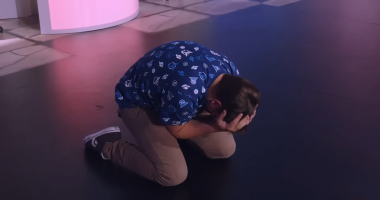

The new CBS All Access series Star Trek: Picard features the return of the iconic character Captain Jean-Luc Picard, last seen in the 2002 film Star Trek: Nemesis. Science fiction author Daniel H. Wilson was pleased to see Patrick Stewart return to the Star Trek universe.
“As an actor, he’s got that character dialed in,” Wilson says in Episode 408 of the Geek’s Guide to the Galaxy podcast, “and I think that it provides a lodestar for the series, because no matter how many logical things don’t make sense, Picard himself will always make sense, because Patrick Stewart knows this character, he embodies this character, and he isn’t going to lead anybody astray.”
The new series draws heavily on the Star Trek: The Next Generation episode “The Measure of a Man,” written by Melinda Snodgrass, in which Picard struggles to uphold the rights of his robot friend Data. Snodgrass enjoyed seeing Picard still fighting that same fight after so many years.
“It reminded me of Don Quixote,” she says, “the old man being cared for by people who are saying, ‘Don’t do that. You’re being foolish.’ And he goes off to tilt at windmills and have a great adventure, and the windmills in this case are Starfleet and the Romulans and all the rest of it. If you try to think of this show as absolutely just about one old man’s journey to find purpose at the end of his life, then I think it all begins to make some sense, in terms of the themes of it.”
In contrast to Star Trek: The Next Generation, which portrays Picard as the unflappable leader of a devoted, professional crew, the new series presents a Picard whose life is full of mistakes and regrets, and whose new crew is highly dysfunctional. Geek’s Guide to the Galaxy host David Barr Kirtley thought that shift sacrificed some of the distinctive flavor of Star Trek.
“The idea that this is a better future where people get along better really stuck with me,” he says, “and watching this new show—I mean, I enjoyed it quite a lot—but I felt like it had more of the tone and more of the characters of Firefly or something, which is totally great, but is just not the way I remember Star Trek.”
But writer Sara Lynn Michener felt that highlighting Picard’s flaws was a necessary step in the development of the character. “In real life, this man would have faults,” she says. “In real life, there would be people around him who would feel jilted by the lack of his attention, who would feel like he had moved past them, and be hurt by that. So I really like the fact that they’re exploring aspects of his character that were always there if you were paying attention, but they never really brought them to the surface.”
Listen to the complete interview with Daniel H. Wilson, Melinda Snodgrass, and Sara Lynn Michener in Episode 408 of Geek’s Guide to the Galaxy (above). And check out some highlights from the discussion below.
Melinda Snodgrass on writing “The Measure of a Man”:
“I fell in love with the Data character, and I realized that there was an infamous Supreme Court decision called Dred Scott, which could really be on point for whether Data has rights—is he a person or is he the property of Starfleet Command? I knew it was a good idea, and [George R. R. Martin] had warned me that I would never sell that spec script, because you never do sell your spec script, and I was going to hold off on writing that one and save it for a pitch, and George said to me, ‘Melinda, never hoard your silver bullet,’ meaning lead with your best thing. So I wrote ‘The Measure of a Man,’ and they not only bought the script, they then ended up hiring me onto the show for half of the second and all of the third season.”
Daniel H. Wilson on robots:
“This whole series is really spurred by Picard’s love for Data, and this idea that Data had a child. And just from a robotics perspective, that didn’t completely convince me. There’s this great Cory Doctorow story about this, where a father has a daughter who uploads herself and basically gets replicated a thousand times. And you realize, ‘What does love mean when there’s a thousand copies of your daughter?’ … Data was a singular sort of entity, and this idea that a piece of him was copied—there could be thousands of these synths out there. So for me it didn’t have that human weight that was really necessary to explain everything else that’s happening during the series.”
Daniel H. Wilson on optimism:
“There’s so much science fiction that is so dark and explores the negative outcomes of technology and science. I wrote Robopocalypse, and all the terrible things that can happen happen, in there, and when I think beyond that, about how to get a more complex story, and really examine what it means to be human, and think about robots and people and simulated life, Star Trek is really one of the few beacons that I can point to that has any sort of optimism about technology or humanity, and it is the DNA of it. And maybe it’s at its best when it’s dark, but it’s certainly not at its most unique, because that is the reason Star Trek endures, is that it’s different from all the other science fiction that’s just so negative.”
Sara Lynn Michener on Seven of Nine:
“I actually stopped watching Star Trek: Voyager when the episode came on where she was revealed to the crew, because she went from being this newly found Borg—unsocialized, totally has no idea how to be a human—and they immediately put her in stilettos and a skin-tight compression suit. It was just the silliest thing. It broke the fourth wall. It was so silly, especially the stilettos. And then they had this whole thing where the doctor was the one who came up with the stilettos. ‘Oh, I picked what I thought would be comfortable for you.’ Bullshit. … So the fact that we could see Seven not only own her trauma, and have a realistic response to it, but also just be dressed in realistic clothes made me incredibly happy.”







